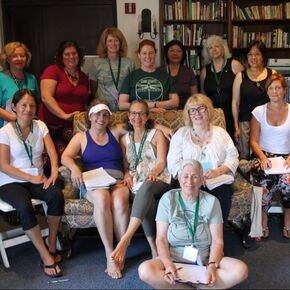|
Body-Mind-Spirit - Inspiration for Writers, Dreamers, and Seekers of Health & Happiness
 Earlier this summer I made my annual trip to Claremont, CA, to teach my Write Where You Are Workshop at Camp Scripps, a four-day summer camp run by and for alumnae of Scripps College. I handed out three pages of prompts, lines gleaned from Nancy Levin’s poetry collection, Writing For My Life. A volunteer read them aloud and people circled the prompts they felt a visceral response to. Some of the most popular were:
We scribbled, nonstop, for thirty minutes. When the timer went off, one woman clutched her notebook to her chest and said, “I am going to hide this—or better yet--destroy it!” Knowing that sometimes the most reluctant participants share the brightest gems, I turned to her and said, “If I had to bet, I’d say you’ve written something very much worth sharing. Would you like to read it?” She turned red. “I didn’t know we were going to have to read what we wrote.” “You don’t have to,” I said, “but in my experience, the more we don’t want to share what we’ve written, the more liberating the process can be. Bearing witness to our life experiences is a profound, sacred, and healing act.” The woman read what she’d written and it was great. She had no idea anyone would care about her marriage, health, and finances. But her writing was closely observed, loaded with details, and her voice was magnanimous and wise. The fact that she had no clue she’d written something wonderful, along with her reluctance to share and her desire to destroy what she’d written, provided valuable lessons. Webster’s New World College Dictionary defines shame as “a painful feeling of having lost the respect of others because of the improper behavior, incompetence, etc. of oneself or another.” For writers, telling the truth can feel like improper behavior. Many of us were raised jumping through hoops trying to please others. As smart, sensitive children we knew what to say to satisfy those around us, even if that meant betraying ourselves. As mature women engaged in the act of truth-telling it can feel like we’re breaking rules. It goes against our “good-girl” conditioning, and this creates feelings of shame, which makes it hard to write the truth. But people have a deep need to voice their truth, to see it, witness it, write and speak about it. Doing so affirms our existence. This is a major reason why we read: to see our lives mirrored back to us. It’s also the case that the personal is universal, especially when closely observed, without judgment. I remind students that just because they write something, it doesn’t mean they’re going to share it with the world. At least not right away. Years may stretch between the moment you write something and its publishing debut, especially if you’re writing a book. The point is, you get to choose what, how, and when to share with others. The main thing is to share first with yourself. Giving yourself permission to speak your truth in the privacy of your own room is a crucial first step toward creative self-expression and healing. At a deeper level, resistance to sharing may reflect a lack of respect for yourself, or an inability to honor yourself. It’s often a clue that you’re judging yourself. We humans do all sorts of things we’re not proud of. But can we forgive ourselves? Can we accept and learn from our circumstances? Can we allow ourselves to be who, what, and where we are? Can we accept our darkness as well as our light? The ability to be honest about our less-than-glamorous selves, to expose our vulnerability and fear—and share it—is a virtue. My old writing teacher, Jack Grapes, used to say, “Your strengths are your weaknesses, and your weaknesses are your strengths.” In order to write, and then share, your innermost truths, you have to make peace with them. This is a life-affirming process, which involves laying down your shame. If you can set it aside, if you can accept your life the way it is, with humility, curiosity, and wonder, you’ll experience deep radiance, which will warm you from the inside out. You will also become a beacon for others yearning to do the same. We are imperfect creatures, perfect in our imperfection, but most important, we are here to learn. When you turn toward what you perceive as your weaknesses you exhibit great strength. This is where your creative power lies. This is your treasure, your gift, and your truth. I’d love to hear about your relationship with shame and how it’s impacted your writing life. Also, please share how you unlock your truth. Or challenges you’ve faced (and perhaps overcome) while doing so!
0 Comments
Leave a Reply. |
Receive over 80 writing prompts from Where Do You Hang Your Hammock to ignite your creativity, gain clarity, and reach your personal and professional goals! You'll also receive my inspirational monthly blog/newsletter. |
“Where the spirit does not work with the hand there is no art.” —Leonardo da Vinci

